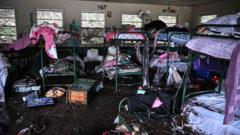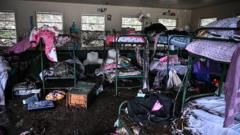Amidst modern societal pressures, young men in the U.S. are finding solace and strength in the Russian Orthodox Church, drawn by its conservative views on masculinity and family values. Leaders like Father Moses McPherson are not only cultivating a surge in converts but fostering a community united by a yearning for stability and tradition.
The Rise of Traditional Masculinity in America's Russian Orthodox Church

The Rise of Traditional Masculinity in America's Russian Orthodox Church
A significant trend emerges as young American men convert to the Russian Orthodox Church, seeking a return to traditional values and masculinity.
In recent months, young men in the U.S. are increasingly flocking to the Russian Orthodox Church, seeking what they describe as “absurd levels of manliness.” In a striking shift from contemporary societal norms, these converts are drawn by church leaders who espouse traditional masculinity, often rejecting modern views perceived as too liberal or feminized.
Father Moses McPherson, a robust priest of five, serves at the Russian Orthodox Church Outside Russia (ROCOR) in Georgetown, Texas. His congregation has seen a threefold increase in 18 months, primarily attracting young men who resonate with his teachings on virile masculinity. Father Moses criticizes modern behaviors associated with femininity, such as wearing skinny jeans or showing emotional vulnerability, and promotes a lifestyle deeply rooted in traditional family values.
The motivations leading these men to the ROCOR vary, but many, like Theodore, a software engineer, express feelings of emptiness despite their successes. He voices concerns over a societal narrative that disparages men for wanting to provide for their families, reflecting a deeper discomfort with contemporary gender roles. This resonates with others in the congregation who opt for home-schooling, prioritizing religious education and familial roles over careers.
Interestingly, the demographics of Orthodox Christians in the U.S. show a significant male majority, with recent data indicating 64% are men—up from 46% in 2007. The pandemic appears to have accelerated these conversions, as many seek purpose and a sense of community amidst uncertainty. Congregations across the country are reporting similar trends of growth and renewal.
The digital landscape has played a crucial role in this resurgence, with Father Moses harnessing social media to amplify his message. His online presence draws attention to family-centric views, advocating for avoiding contraception and embrace of larger families. His outspoken condemnation of modern practices is viewed as refreshing by many who believe traditional structures provide stability in an increasingly chaotic world.
While ROCOR constitutes a small fraction of American Christianity, its influence is palpable, particularly amid broader cultural shifts. Some converts view Russia as a bastion of true Christianity, contrasting sharply with prevailing liberal attitudes in their home country. This sentiment, however, is not without controversy; the church’s leadership in Russia, notably Patriarch Kirill, consistently backs government actions, including the invasion of Ukraine, framing it as a spiritual conflict.
As these men embrace their newfound faith, figures like Buck Johnson highlight a collective move away from instant gratification and materialism towards deeper community and familial values. Their journey illustrates a quest for belonging, identity, and tradition in a rapidly changing society.
In summary, the emerging trend of young men gravitating toward the Russian Orthodox Church signifies a deeper yearning for conservative values and traditional masculinity, revealing the complexities of faith and identity in contemporary America.





















